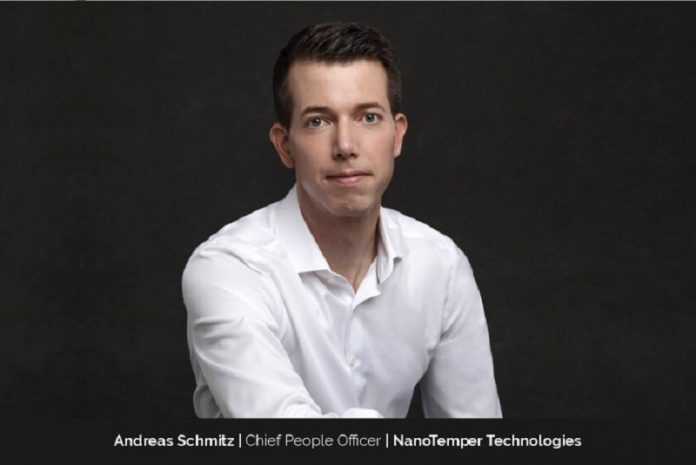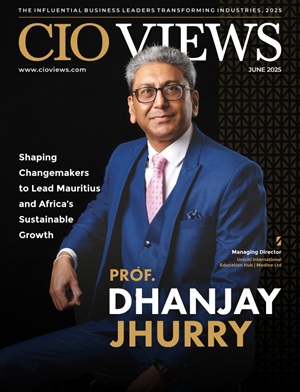
It created quite a stir when a successful leader of one of the most respected top 50 companies in the world moved to an unknown small company. Highly respected by his employees, internal and external peers, and top leadership, Andreas Schmitz left as Head of HR, Member of the German Executive Board, co-responsible for 17,000 people, and joined as first Chief People Officer at NanoTemper Technologies (NTT).
NanoTemper’s vision is helping create a world where every disease is treatable. The company is specialised in developing instruments (biophysical tools) for scientists and research teams in pharmaceutical drug discovery and development, who need to tackle challenging characterizations of their drug candidates.
That way those teams around the world are enabled to discover new drugs and vaccines, which were thought impossible in the past. The NanoTemper teams have deep scientific expertise and try to anticipate which tools scientists will need for their research in 3, 5, and 10 years from now.
A purposeful job in a company with a clear purpose
At NanoTemper, Andreas says he found a huge overlap in the values of the founders and his own. In addition, he saw that the growth potential of the company and its people was huge. So, the combination of a purposeful job in a company with a clear purpose and similar values seems like a good fit.
Some might say this rather bold move that Andreas made seems like a step back in his career. But he begs to differ. “Well, my career path and trajectory look quite straight and focused, at least superficially. But it was definitely not that way all the time. I’m not following a clear career goal. I’m following my energy, and my values,” he states.
Indeed, Andreas’ path to HR seems rather straight forward and well planned out, like the classic chimney career. “When finishing high school, I was glad to still serve in the military for a year, which was somewhat mandatory in the late 90s. So I could think a bit about what to do next. In the end, I just followed my girlfriend to study in Karlsruhe. Something with business cannot be wrong,” he declares.
But he still had no clue about what sort of job he wanted to do. Perhaps marketing or sales or working as a consultant sounded cool. “Today, I am actually a little bit of all of this,” Andreas observes. “As first Chief People Officer, I obviously lead all people operations and people practices. But I’m also in charge of the overall company strategy process at the moment.”
“The founders and CEOs know about the importance of our culture and people, and that it’s the one key to ensure the successful development and growth of the company. That’s why I joined, and why I’m in constant exchange with them, not only about classic HR topics, but about how the company is run overall in the optimal way, coming closer to our vision,” Andreas explains.
One key to Andreas’ future plans for NTT include implementing a partner ecosystem. Having close and sustainable relationship to specialized partners in the vast field of Human Resource topics helps to avoid building up huge teams or making everyone in a small team try to know everything. Tapping into a pool of HR subject matter experts enables NTT HR to make use of the latest practices on an as needed basis. It is still important that ecosystem is managed and orchestrated well so the partner companies have an understanding of NanoTemper, our goals, principles, and ways to operate. That way NTT can nurture the strong culture by high quality and still very consistent people and leadership practices, fostering sustainable (healthy) high-performance teams.
He learned early on in his HR career that HR practices can feel very generic and most are. The difference is in how well these practices reflect the company’s values and really support or even drive business results. Whether it concerns the way you reward a desired behaviour, the kind of skills or mindset you hire for, or how leadership is assessed, the more consistent your people practices are, the greater the impact you can generate.
Understanding the impact, you can have in HR
Andreas recalls that his starting point in HR was rather coincidental, and his passion for basketball played a role. “A teammate of mine at university knew I needed a summer internship. And, as he wanted to have me stay around, he arranged an interview with a company nearby,” he says.
That company was SAP, one of the most respected companies in Germany, and the hiring manager was Stefan Ries, who later became the Executive Board Member for HR at SAP.
“I admired Stefan and still do. He showed me the impact you can have in HR, way beyond the classical HR topics. He shaped the company’s strategy with a clear business focus of HR work. I wanted to do that, too – having an impact, making the shallow words of people being the most important asset, true and measurable. I still think we’re wasting so much talent while not having in mind what really drives people and what makes organizations successful,” Andreas remarks.
He observes that we live in exciting times, and the importance of connecting HR, the people, and technology for business impact has never been stronger. COVID was the catalyst that changed expectations to HR and its leaders quite dramatically.
“We are a small internal HR team. So, I’m creating an ecosystem of HR partners, some very close to us, fully integrated in all we do, others more on the periphery depending on the need,” Andreas remarks.
He maintains that making sure all of them understand the company’s culture and the direction of the NanoTemper Way is important. Coordinating and orchestrating such an ecosystem becomes a strategic advantage. It is not just outsourcing but making sure you always have the best HR experts, and the best tech solution available instantly, without a huge selection and evaluation process.
Andreas believes that they have only started to leverage the potential they have in HR. Due to his work with HR Tech companies, and recently as advisor to a VC focused on HR Tech start-ups, he still sees a rather slow adoption of people-related technology.
“And, I do not mean the classic HR ERP systems, but the many new cloud applications that do not require huge implementation time yet can be very powerful. Define the problem you’re trying to solve, plug-and-play a new app, evaluate it, and decide if it can solve your problem at scale. Then decide to toss it or keep it,” Andreas recommends.
He prefers not to focus on a specific solution but feels the need to think much more in integrated networks. Andreas likes to keep his HR team rather small. He hopes to get NTT on the map for the best talents and make it a talent magnet, keeping and attracting talented people who would like to join them on the NanoTemper Way.
For Andreas, this is important in preparing NTT for an even steeper scale up the curve, with the sustainable expansion of business, to help even more research teams find cures or vaccines for all the nasty diseases out there.
Learning the lessons of leadership
Andreas’ first hands-on experience what Corporate Leadership means, was at an internship in New York City. “I underestimated how difficult leadership sometimes can be when you have to do it yourself,” he admits.
When Andreas did his internship in the SAP Global Marketing Headquarters, most Interns came from either top Ivy League business schools, were closely related to a senior board member, or both. He was none of these, which increased the pressure on him to really perform.
David Kaput, VP Human Resources for SAP Global Marketing at the time, was a role model for Andreas. “A few months after I started, I was put in charge to do the bonus calculations for about 500 employees. Back then, I did it in Excel and Access. When I got the info to increase everyone’s performance-based bonus by a specific number, I did,” he shares.
However, as it turned out, Andreas had made an error in his calculations, paying out too much, resulting in a significant overspend. “Of course, I thought I’m fired right away when David came to me after he talked to the Global Head of Marketing. But David said I should not worry. He put me in charge, so he took the blame. He did. I stayed,” he recalls.
David even managed to position this as extra effort money to the employees. He trusted Andreas and continued to do so. Leaders take the blame if something goes wrong, and let people shine when they do well. He noticed that Andreas had huge talent, and that was why he assigned him work that was a bit out of his comfort zone.
Once Andreas had seen the impact he could have in the field of HR and as a leader, he realized that he might not be completely out of his element. “Working with global leadership teams, my internal client groups helped me to progress. When I moved to the US to take on my first real global HR role, it became clear to me that my style of leadership seemed to be resonating with people. I was able to build a network of local HR contacts to ensure the client unit would be supported in a better way,” says Andreas.
Andreas believes that if you trust people, develop them, coach them, create opportunities and shape an environment they feel safe in, it will unleash their potential. He has seen employees who were performing OK’ish, becoming superstars when you tapped into their potential by leveraging their strengths and let them do, what they do best.
HR Tech as Enabler
Andreas also observes that there is still so much wasted talent out there, which is why he’s also very active in the HR Tech Start-up scene, helping and supporting them as business angel, creating connections giving feedback. Lately, he has also been advising an HRTech VC and its portfolio companies.
“After COVID, more companies realized how much better we could do, imagining we couldn’t really tap into all employees’ true and full potential. The combination of business focus and people centricity, enabled by technology, is the key,” Andreas maintains. “When moving to the US in the Bay Area, as global HR BP at SAP, I experienced the vibrant feeling of Silicon Valley – the ‘Can-Do, Just-Do’ attitude; the spirit to take a risk fail and try again; and the power of technology, if applied meaningfully.”
The time Andreas spent in the US were highly valuable, a great learning experience. He worked with great HR people and senior leaders about the varying needs of people, what diversity and inclusions really means in a truly diverse environment like the Silicon Valley. And Andreas was exposed to the variety of technologies that come up every day, each of them trying to solve some problem. Compared to other functions, innovative HR Tech Companies had a more difficult time. It seems, especially in Europe, the regulated environment, the complex legal systems and strict data protection laws have slowed down technologic advancements for HR in Europe.
“A lot of my HR executive colleagues at other companies have had negative experiences with HR tech. That is not because the solutions don’t work. But there is still a group of people that are not comfortable with the things you can do with technology.” Andreas understands that in the people business you need to be careful with data. Still, he sees the opportunities it can bring, helping people and organizations to find the best match of roles and people, finding best solutions for their challenges, being able to anticipate certain business scenarios which could help to be more transparent earlier.
However, Andreas realizes, in his profession it is still about people. Technology is only a vehicle. Maybe still underutilized in some areas of the HR function. But there is still a lot of people out there who prefer interacting directly with a human being. Especially when it comes to very personal topics, employees want to get consulted by someone they can see and they know. Technology can then only help the HR person to find the best solution for the employee. Again, being people centric is a key.
This is something Andreas learned when he changed companies and roles from a very global and strategic position of an global HR Business Partner at SAP to much more local roles at Roche in Germany.
Know your Priorities in life
For his SAP colleagues Andreas change of companies came as a surprise. They know he was going back to Germany as his girlfriend at the time (wife today) could not come to the US. He already got the offer to work directly for the Chief HR Officer at the time.
Andreas decided against it and started a local HR role near Munich at Roche in Germany.
“My girlfriend was in Munich. After 2 years of a long distance relationship, I did not want to commute and be away 4 days a week. So, I accepted a solid local HR Business Partner job at Roche. I must say, it had been an inner fight though. At that time, I was not so super clear about my priorities in life”.
It looked like a step back, moving away from global roles, working with the most senior leaders in the most respected tech company of Germany.
A local role in a remote site of a big Pharma company did not seem to fit. Andreas followed his energy and values. In this case family was more important than a glamorous job.
“To me, it was again a good learning opportunity. The local HR Business Partner role in an operational environment got me in touch with very down to earth people topics.”.
It should not stay that way for long.
After not even 2 years as HRBP supporting his clients in all HR matters, designing HR programs and some M&A work, he found himself as Head of HR for the site in Greater Munich soon.
The site grew in a few years from 4500 to 7000 employees while Andreas led the HR team for the site.
When the Head of HR for all of Germany, another mentor of Andreas, retired, Andreas succeeded him and all of a sudden was in charge of 17.000 Roche employees in Germany, directly leading an organization of 300 HR pros, vocational trainers, and medical teams.
Yet, what looks like a smooth and straight forward move was tough. “I had 19 interviews, was put on hold for some time, and finally competed against a few external candidates in a well-designed assessment center. Something I always tried to avoid in my career.”
At age of 38, Andreas was 15 to 20 years younger than all other former Heads of HR for the country. In Germany the role carries a major legal responsibility as well as being the key interface to the Union system. The company wanted to make sure he really could do the job. Yet, senior leaders at Roche, like Kristen Pressner, Global Head of HR for the worldwide Diagnostics Division at Roche believed in Andreas’s capabilities and thought he could succeed.
Well, he could.
Looking at Andreas list of accomplishments, he reports he is especially proud of two of them.
Firstly, his HR team managed to position Roche in Germany to be rated the Number 1 employer in the Glassdoor ranking 2021, outperforming the local top employers like SAP, or Google or Porsche. “We actually cut down a lot of HR initiatives which took forever to be completed. Instead, we worked on and finished a few of them with higher people and business impact. So, people in the business could focus on what mattered most. Plus, my HR team’s Covid management was just outstanding”. Those actions drove employee engagement a lot, and business performance of the German sites was extremely high, too.
Secondly, Andreas put together a diverse and energetic team of leaders, some with deep HR know-how, some with high empathy for people, others with a strong business background. The leadership team embodied the key mantra of Andreas to be people centric and business focused. “I am proud of the accomplishments of that team. We created an environment with a high degree of trust. We could fight in conflicts, challenge and hold each other accountable, get rid of ego and help the other to achieve the team result. Even if it meant you might not achieve your own individual goals.” The team was so close it almost became an issue as no one wanted to move on when they were offered attractive and much higher compensated roles within Roche.
But after 11 years at Roche and with such a great team, yet another inner fight started in Andreas. Continue the very steep and successful career at Roche or try something completely new.
When a transformation of the worldwide HR group dissolved the team, Andreas started thinking again. Reflecting on his priorities, he came to the conclusion to leave his comfort zone at Roche and the corporate world.
“When I decided to leave Roche, I was approached by a few other large companies. Some roles sounded very attractive, using the skills I had learned over time.”
But Andreas wanted something different. Being very clear on his priorities and his values by then, he was looking for a unique match. Looking for a place in which his values overlap with the way the company is lead, place which is on its way to become truly business focused, and people centric.
He found this at NanoTemper Technologies.




















